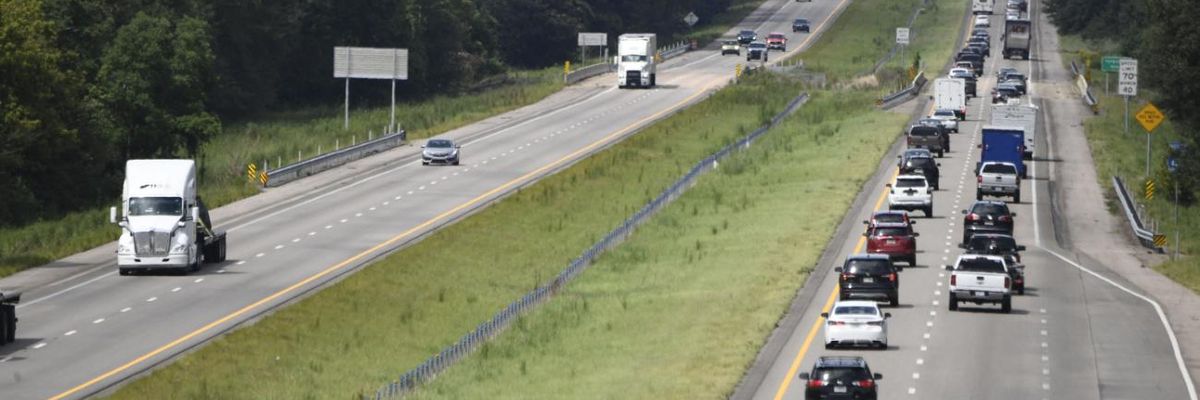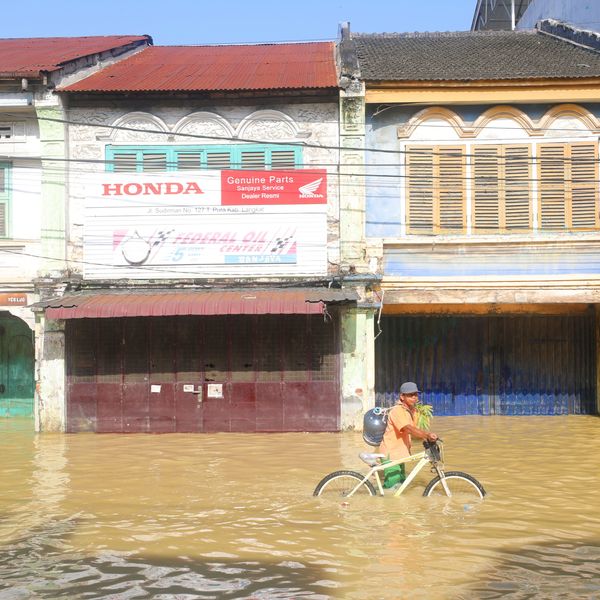
Residents drive north on Interstate Highway 55 near Magnolia, Mississippi, as they evacuate away from New Orleans on August 28, 2021 before the arrival of Hurricane Ida. (Photo: Patrick T. Fallon / AFP via Getty Images)
Experts Warn of 'Potentially Catastrophic' Destruction as Hurricane Ida Reaches New Orleans
The storm is expected to be one of the strongest ever to hit Louisiana, rivaling Hurricane Laura in 2020.
This is a developing story and may be updated.
Weather experts on Sunday said their worst-case-scenario predictions about Hurricane Ida, which damaged homes and knocked down trees in Cuba on Friday, appeared to be coming true as the tropical cyclone made its way towards New Orleans with winds rushing at 150 miles per hour.
\u201cI feel ill watching this hurricane. The eyewall lightning activity, the structure observed via radar, the satellite presentation, and the aircraft observations all highlight a strong and still-intensifying storm. Right up to landfall.\u201d— Dr. Kim Wood, @drkimwood@mastodon.world (@Dr. Kim Wood, @drkimwood@mastodon.world) 1630240536
"Monster storms cause enormous damage not only because of their winds," wrote Tom Yulsman, director of the Center for Environmental Journalism and a blogger for the magazine. "They also dump unimaginable amounts of water. And research shows that thanks to climate change, they've been getting wetter."
Yulsman continued:
That's happening for a number of reasons. First, a warmer atmosphere can carry more moisture. Research shows that for every one degree Celsius (1.8 degrees Fahrenheit) increase in temperature, the atmosphere can hold 7 percent more moisture. So far, the globe has warmed by about 1.1 degrees Celsius since preindustrial times.
On Twitter, climate scientist Katherine Hayhoe said the question of whether the climate crisis "causes" hurricanes like Ida is "the wrong question."
"The right one is, 'How much worse did climate change make it?" Hayhoe said.
\u201cClimate change didn't cause Hurricane Ida, an "explosively intensifying tropical storm" bearing down on Louisiana on the anniversary of Katrina. But it's virtually certain it made it worse. https://t.co/kWHmX6QPSr\u201d— Prof. Katharine Hayhoe (@Prof. Katharine Hayhoe) 1630244188
"Given that science has already showed that a warmer ocean and other aspects of climate change are leading to much faster intensification of hurricanes," Hayhoe added, "the question today is not, to paraphrase climate scientist Kevin Trenberth, how could climate change affect this event--but rather how could it NOT, as it is occurring over the massively altered background conditions of our 1.1C warmer planet."
An Urgent Message From Our Co-Founder
Dear Common Dreams reader, The U.S. is on a fast track to authoritarianism like nothing I've ever seen. Meanwhile, corporate news outlets are utterly capitulating to Trump, twisting their coverage to avoid drawing his ire while lining up to stuff cash in his pockets. That's why I believe that Common Dreams is doing the best and most consequential reporting that we've ever done. Our small but mighty team is a progressive reporting powerhouse, covering the news every day that the corporate media never will. Our mission has always been simple: To inform. To inspire. And to ignite change for the common good. Now here's the key piece that I want all our readers to understand: None of this would be possible without your financial support. That's not just some fundraising cliche. It's the absolute and literal truth. We don't accept corporate advertising and never will. We don't have a paywall because we don't think people should be blocked from critical news based on their ability to pay. Everything we do is funded by the donations of readers like you. Will you donate now to help power the nonprofit, independent reporting of Common Dreams? Thank you for being a vital member of our community. Together, we can keep independent journalism alive when it’s needed most. - Craig Brown, Co-founder |
This is a developing story and may be updated.
Weather experts on Sunday said their worst-case-scenario predictions about Hurricane Ida, which damaged homes and knocked down trees in Cuba on Friday, appeared to be coming true as the tropical cyclone made its way towards New Orleans with winds rushing at 150 miles per hour.
\u201cI feel ill watching this hurricane. The eyewall lightning activity, the structure observed via radar, the satellite presentation, and the aircraft observations all highlight a strong and still-intensifying storm. Right up to landfall.\u201d— Dr. Kim Wood, @drkimwood@mastodon.world (@Dr. Kim Wood, @drkimwood@mastodon.world) 1630240536
"Monster storms cause enormous damage not only because of their winds," wrote Tom Yulsman, director of the Center for Environmental Journalism and a blogger for the magazine. "They also dump unimaginable amounts of water. And research shows that thanks to climate change, they've been getting wetter."
Yulsman continued:
That's happening for a number of reasons. First, a warmer atmosphere can carry more moisture. Research shows that for every one degree Celsius (1.8 degrees Fahrenheit) increase in temperature, the atmosphere can hold 7 percent more moisture. So far, the globe has warmed by about 1.1 degrees Celsius since preindustrial times.
On Twitter, climate scientist Katherine Hayhoe said the question of whether the climate crisis "causes" hurricanes like Ida is "the wrong question."
"The right one is, 'How much worse did climate change make it?" Hayhoe said.
\u201cClimate change didn't cause Hurricane Ida, an "explosively intensifying tropical storm" bearing down on Louisiana on the anniversary of Katrina. But it's virtually certain it made it worse. https://t.co/kWHmX6QPSr\u201d— Prof. Katharine Hayhoe (@Prof. Katharine Hayhoe) 1630244188
"Given that science has already showed that a warmer ocean and other aspects of climate change are leading to much faster intensification of hurricanes," Hayhoe added, "the question today is not, to paraphrase climate scientist Kevin Trenberth, how could climate change affect this event--but rather how could it NOT, as it is occurring over the massively altered background conditions of our 1.1C warmer planet."
This is a developing story and may be updated.
Weather experts on Sunday said their worst-case-scenario predictions about Hurricane Ida, which damaged homes and knocked down trees in Cuba on Friday, appeared to be coming true as the tropical cyclone made its way towards New Orleans with winds rushing at 150 miles per hour.
\u201cI feel ill watching this hurricane. The eyewall lightning activity, the structure observed via radar, the satellite presentation, and the aircraft observations all highlight a strong and still-intensifying storm. Right up to landfall.\u201d— Dr. Kim Wood, @drkimwood@mastodon.world (@Dr. Kim Wood, @drkimwood@mastodon.world) 1630240536
"Monster storms cause enormous damage not only because of their winds," wrote Tom Yulsman, director of the Center for Environmental Journalism and a blogger for the magazine. "They also dump unimaginable amounts of water. And research shows that thanks to climate change, they've been getting wetter."
Yulsman continued:
That's happening for a number of reasons. First, a warmer atmosphere can carry more moisture. Research shows that for every one degree Celsius (1.8 degrees Fahrenheit) increase in temperature, the atmosphere can hold 7 percent more moisture. So far, the globe has warmed by about 1.1 degrees Celsius since preindustrial times.
On Twitter, climate scientist Katherine Hayhoe said the question of whether the climate crisis "causes" hurricanes like Ida is "the wrong question."
"The right one is, 'How much worse did climate change make it?" Hayhoe said.
\u201cClimate change didn't cause Hurricane Ida, an "explosively intensifying tropical storm" bearing down on Louisiana on the anniversary of Katrina. But it's virtually certain it made it worse. https://t.co/kWHmX6QPSr\u201d— Prof. Katharine Hayhoe (@Prof. Katharine Hayhoe) 1630244188
"Given that science has already showed that a warmer ocean and other aspects of climate change are leading to much faster intensification of hurricanes," Hayhoe added, "the question today is not, to paraphrase climate scientist Kevin Trenberth, how could climate change affect this event--but rather how could it NOT, as it is occurring over the massively altered background conditions of our 1.1C warmer planet."

